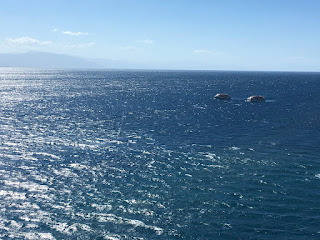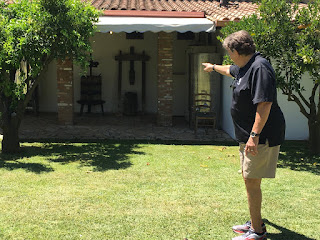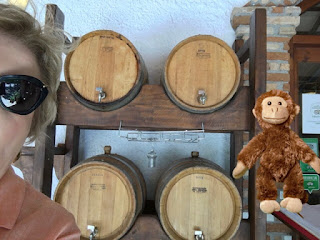 Back for a second visit- last week when visiting this seaside town, we went out to the original Olympic Village- this time Bubba picked a farm to visit. Joy. As we prepare for the farm, the captain makes an announcement- "slight problem- another ship took our berth so I must decide if we can anchor and use the tenders today- bumpy sea and a strong breeze" (AMEN!). Oh Darn-we might have to miss the farm tour...
Back for a second visit- last week when visiting this seaside town, we went out to the original Olympic Village- this time Bubba picked a farm to visit. Joy. As we prepare for the farm, the captain makes an announcement- "slight problem- another ship took our berth so I must decide if we can anchor and use the tenders today- bumpy sea and a strong breeze" (AMEN!). Oh Darn-we might have to miss the farm tour...Ah, no such luck, the masterful tender drivers bob and weave to get us to the town - bouncy sea and all. No life lost.
GREEK LIQUID GOLD
 And onward we go to the Olive Farm- Pleep does a little Olive fact finding homework for us. Did you know over 750 million olive trees are cultivated worldwide, 95% of which are in the Mediterranean region. Most of global production comes from Southern Europe, North Africa and the Near East.
And onward we go to the Olive Farm- Pleep does a little Olive fact finding homework for us. Did you know over 750 million olive trees are cultivated worldwide, 95% of which are in the Mediterranean region. Most of global production comes from Southern Europe, North Africa and the Near East.
Of the European production, 93% comes from Spain, Italy and Greece. Spanish province of Jaén is well known for the biggest olive groves in the world.
Spain is the country with the highest number of olive trees (more than 300 million), and is nowadays the world's leading olive and olive oil producer and exporter. Of the 5.19 million acres of olive groves, 92% are dedicated to olive oil production. The average annual production varies due to the cyclical nature of the harvest, but typically runs between 600,000 and 1,000,000 metric tons, only 20% of which is prized Greek olive variety for oil production is the Koroneiki, originating from the area of Korone in Messenia, Peloponnese. This variety grows well on mountain slopes and produces very small fruit; the high ratio of skin to flesh giving the oil its coveted aromatic qualities. The variety is also suited to the production of agourelaio, oil from olives that are slightly unripe. When crushed in presses that are not capable of grinding the stone, this oil is entirely free of acidity and possesses top-tier organoleptic characteristics. Because not crushing the stones reduces oil yield, production of agourélaio is limited to "boutique" presses run by entrepreneurs and small cooperatives.
Among the many different olive varieties or cultivars in Italy are Frantoio, Leccino Pendolino, and Moraiolo; in Spain the most important varieties are the Picual, Alberquina, Hojiblanca, and Manzanilla de Jaén; in Greece, Koroneiki; in France, Picholine; in California, Mission; in Portugal, Galega; in Croatia, Oblica and Leccino. The oil from the varieties varies in flavour and stability (shelf life). Tell us more about the Greek Olives Pleep.
But what about Greece?
But what about Greece?
 The hills of Kalamata, on the southern coast of Greece's Peloponnese peninsula, produce some of the best olives in the world. When pressed, they produce an oil that is almost fluorescent green and sometimes described as liquid gold. Per Bubs, "And the Whole Foods prices for the Greek olive oil reflect it"!
The hills of Kalamata, on the southern coast of Greece's Peloponnese peninsula, produce some of the best olives in the world. When pressed, they produce an oil that is almost fluorescent green and sometimes described as liquid gold. Per Bubs, "And the Whole Foods prices for the Greek olive oil reflect it"! But after much of that oil is pressed in Greek processing facilities, tanker trucks come to take it straight to the sea. In 2015, 60 percent of Greece's olive oil output was shipped to Italy. There, it is packaged in Italian bottles with Italian labels, and then sent around the world. And most of the profits go back to Italy. Italy captures an extra 50 percent premium on the price of Greek oil.
But after much of that oil is pressed in Greek processing facilities, tanker trucks come to take it straight to the sea. In 2015, 60 percent of Greece's olive oil output was shipped to Italy. There, it is packaged in Italian bottles with Italian labels, and then sent around the world. And most of the profits go back to Italy. Italy captures an extra 50 percent premium on the price of Greek oil.
The farm workers greet the Pleepster with some Ouzo and their homemade wine....never to early in the day to start as he is a thirsty monkey.

The lady, who along with her husband, owns the farm. She shares with us all about the life of growing olives. This gizmo is put up in the tree to gently shake the olives down.

Looks like a Whirly Gig to Pleep. Our owner is very proud of her Olives- the trees and farm have been in the family for 5 generations.
And what about those Greek Olives? Per Forbes: FROM STRIVING TO THRIVING-This glimmer of hope is the revival of the ancient Hellenic medicinal quality of EVOO (extra virgin olive oil). This exemplary category of olive oil was traded far and wide by the ancient Hellenes across the Mediterranean and beyond. In their cargo were seedlings of olive trees which they planted wherever they set up colonies or found suitable conditions. The Hellenes were the most active traders in ancient times, willing to face the dangers crossing vast distances by sea to transport their cargo and open ever more trade routes.
 This tradition of seafaring is still strong to this day. Greeks own and command the largest merchant shipping fleet in the world. Surprised? I was when I first found this out. How is it that a small nation of fewer than 15 million people owns more ships than China. Russia, the USA or the United Kingdom? The reason for their unrivaled sea faring success can be traced back to their original cargo. They carried a commodity the ancient world hungered for. The modern world is finally understanding why!
This tradition of seafaring is still strong to this day. Greeks own and command the largest merchant shipping fleet in the world. Surprised? I was when I first found this out. How is it that a small nation of fewer than 15 million people owns more ships than China. Russia, the USA or the United Kingdom? The reason for their unrivaled sea faring success can be traced back to their original cargo. They carried a commodity the ancient world hungered for. The modern world is finally understanding why!
And what about those Greek Olives? Per Forbes: FROM STRIVING TO THRIVING-This glimmer of hope is the revival of the ancient Hellenic medicinal quality of EVOO (extra virgin olive oil). This exemplary category of olive oil was traded far and wide by the ancient Hellenes across the Mediterranean and beyond. In their cargo were seedlings of olive trees which they planted wherever they set up colonies or found suitable conditions. The Hellenes were the most active traders in ancient times, willing to face the dangers crossing vast distances by sea to transport their cargo and open ever more trade routes.


This tradition of seafaring is still strong to this day. Greeks own and command the largest merchant shipping fleet in the world. Surprised? I was when I first found this out. How is it that a small nation of fewer than 15 million people owns more ships than China. Russia, the USA or the United Kingdom? The reason for their unrivaled sea faring success can be traced back to their original cargo. They carried a commodity the ancient world hungered for. The modern world is finally understanding why!

Wherever you stand on Greece and Germany, there's certainly plenty of blame to go around. Greece's European creditors continue to negotiate for austerity measures and oppose forgiving Greece's debts, against the counseling of the International Monetary Fund. Under seemingly endless debt and austerity, Greece's economy has shrunk by about a quarter over the last five years, and unemployment is around 25 percent. Keep those garbage strikes rolling...
But Greece's economic misery is also, to a certain extent, self-imposed. Beyond Europe, there are many things that Greece might to do to improve its struggling economy by promoting native industry and unwinding onerous restrictions, as James Surowiecki recently wrote in the New Yorker.
Many segments of the economy are excessively regulated: As Surowiecki points out, bakeries can only sell bread in a few standardized weights. Other red tape prevents people from starting new businesses and foreigners from investing in Greece from abroad.
The fact that Greece holds only a 28 percent share of the global market for "Greek Feta cheese" and 30 percent of U.S. market for "Greek-style yogurt" also shows a clear commercial opportunity. Greece's agricultural sector has a lot of potential. As mentioned, Greece is the third largest olive oil producer worldwide, and is nearly on par with Italy, which is number two after Spain. In fact, Costco changed the source of its Kirkland brand olive oil from Italy to Greece earlier this year after a disease ravaged the Italian crops.
Olive oil alone represents nearly a tenth of Greece's agricultural output, according to Eurostat. Greece also exports honey, wine, fruit and vegetables around the world, and could do much more. Beyond agriculture, some of Greece's most promising sectors are generic pharmaceuticals, aquaculture, elder care, cargo and logistics transport, waste management and tourism, says a McKinsey report. Tourism alone accounted for over 17 percent of Greece's economy in 2014. And who knew most tourists in Greece are Greek rather than foreigners, suggesting a huge opportunity. Huh? Ya could have fooled me.
 What would Greece need to take advantage of these opportunities? Financial stability, for one. The credit freeze earlier this year has made life for Greece's food industries even more difficult, freezing imports of necessary farm inputs like fertilizers, pesticides and fuel. Beyond that, Greece needs infrastructure, including larger and more modern production and packaging facilities to take advantage of its agricultural capacity, says McKinsey.
What would Greece need to take advantage of these opportunities? Financial stability, for one. The credit freeze earlier this year has made life for Greece's food industries even more difficult, freezing imports of necessary farm inputs like fertilizers, pesticides and fuel. Beyond that, Greece needs infrastructure, including larger and more modern production and packaging facilities to take advantage of its agricultural capacity, says McKinsey.
We are getting our phd in Oliveology.
 Why is there a security camera in the olive processing room?? Must be on the look out for some of those "big opportunities".
Why is there a security camera in the olive processing room?? Must be on the look out for some of those "big opportunities".
This tree is over 1000 years old and some are 3-4000 years old.
 Yup, that sure looks like the wine press Papoo had in the basement.
Yup, that sure looks like the wine press Papoo had in the basement.
My hubby - a peach of a guy...groan.

This is right up my alley Boca...keep that dream alive dear Bubs.

Keep your paws off their tomatoes!

Zuchinni inspector by day...

The owner said they had a serious/deadly fly problem and used to use pesticides dropped from airplanes but now they have come up with an eco friendly fly killer- they hang it on a tree and voila!

Pleep had some fun with the Greek version of "my little pony". And no Pleep we are not getting one!

Time for lunch, let's head over to the dinning venue...the "farm" was really lovely- bucolic, clean and quite modern.

It's all Greek to me!



And a good time was had by all!

Pleep suggested that Bubs buy him this sculpture as it would encourage his practicing of Greek dancing for Alex's Big Fat Greek Wedding - OPA!

Boca suggested we might want to consider ordering the wine this way rather than one case at a time via Costco. Pleep concurs.

So many choices.
 The requisite gift shop for your needs....a little honey tasting never hurt anyone.
The requisite gift shop for your needs....a little honey tasting never hurt anyone.And no Boca, we don't need a 4ft angel with wings.

 Pleep suggested that an Olive Tree sculpture would help him with his exercise program back in Naples.
Pleep suggested that an Olive Tree sculpture would help him with his exercise program back in Naples.Ok, one box of some Loukoumi.


He found the perfect T shirt as a remembrance of his day at he farm.


Bubs always gets a kick out of them....do you have any?

TO END A FUN DAY...pool party. It has cooled down beautifully and with a nice breeze on the bought many up on deck again. Hallelujah!

And Boca and Bubs find their favorite bartender- now moved from the Observation Bar to the pool deck bar....martini's in plastic? You'll live Boca- she still has your favorite Greek olives!
 And the weather is so pleasant how about dinner on the back of the boat Boca? Good choice Bubs.
And the weather is so pleasant how about dinner on the back of the boat Boca? Good choice Bubs.
Thoroughly enjoyed the evenings entertainment- Hillary O'Neil, from the UK- talented and very humorous....and good teeth. But Bubs and Pleep thought good something else....boys!

Call me Hills, Boca. And yes I can put you in touch with my Russian dressmaker- perfect selection for your daughters wedding. Of course you won't look like a tomato-this dress has MOTHER OF THE BRIDE written all over it. Bubs you need to up your picture taking game - no photo bombing allowed!